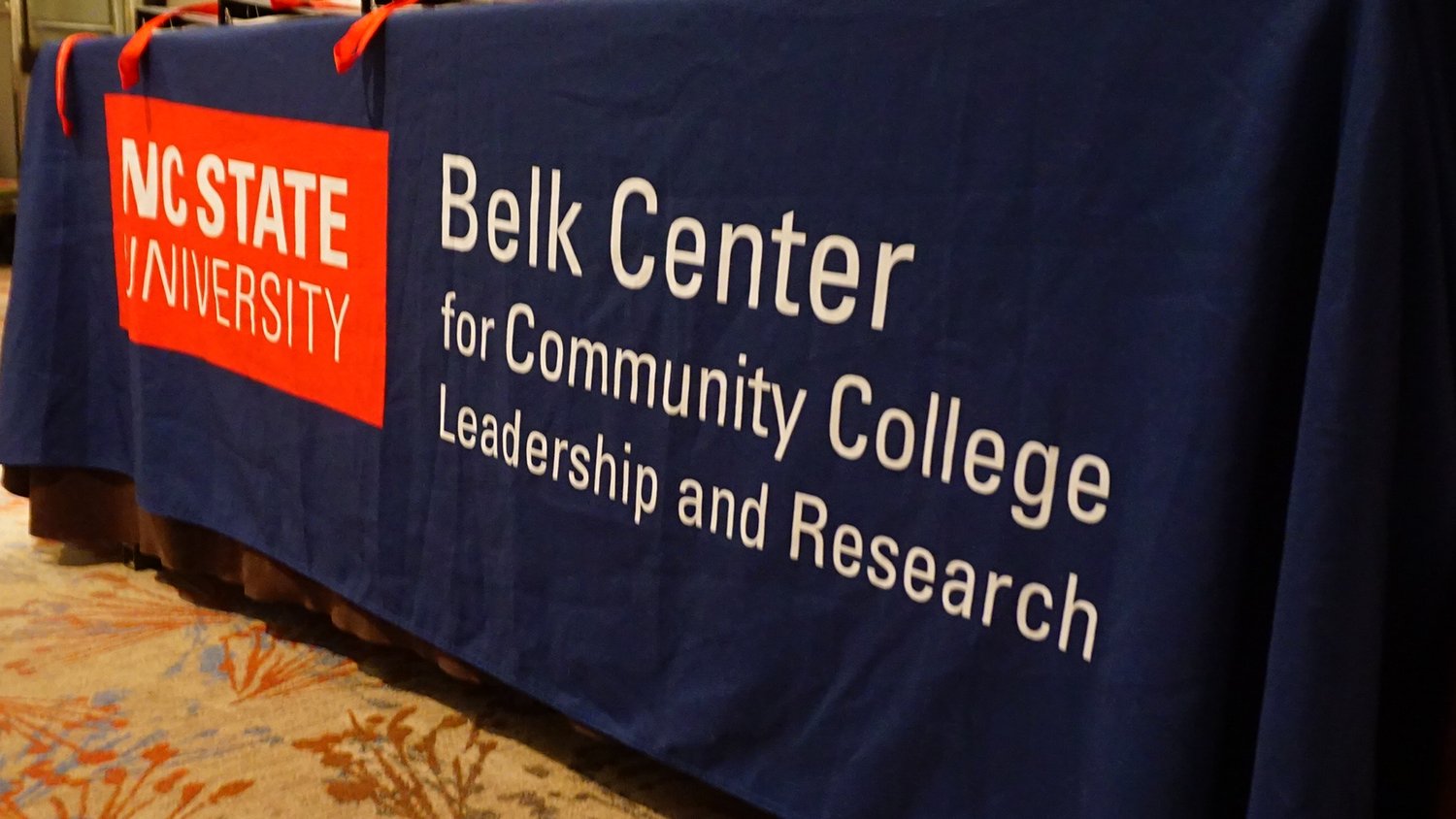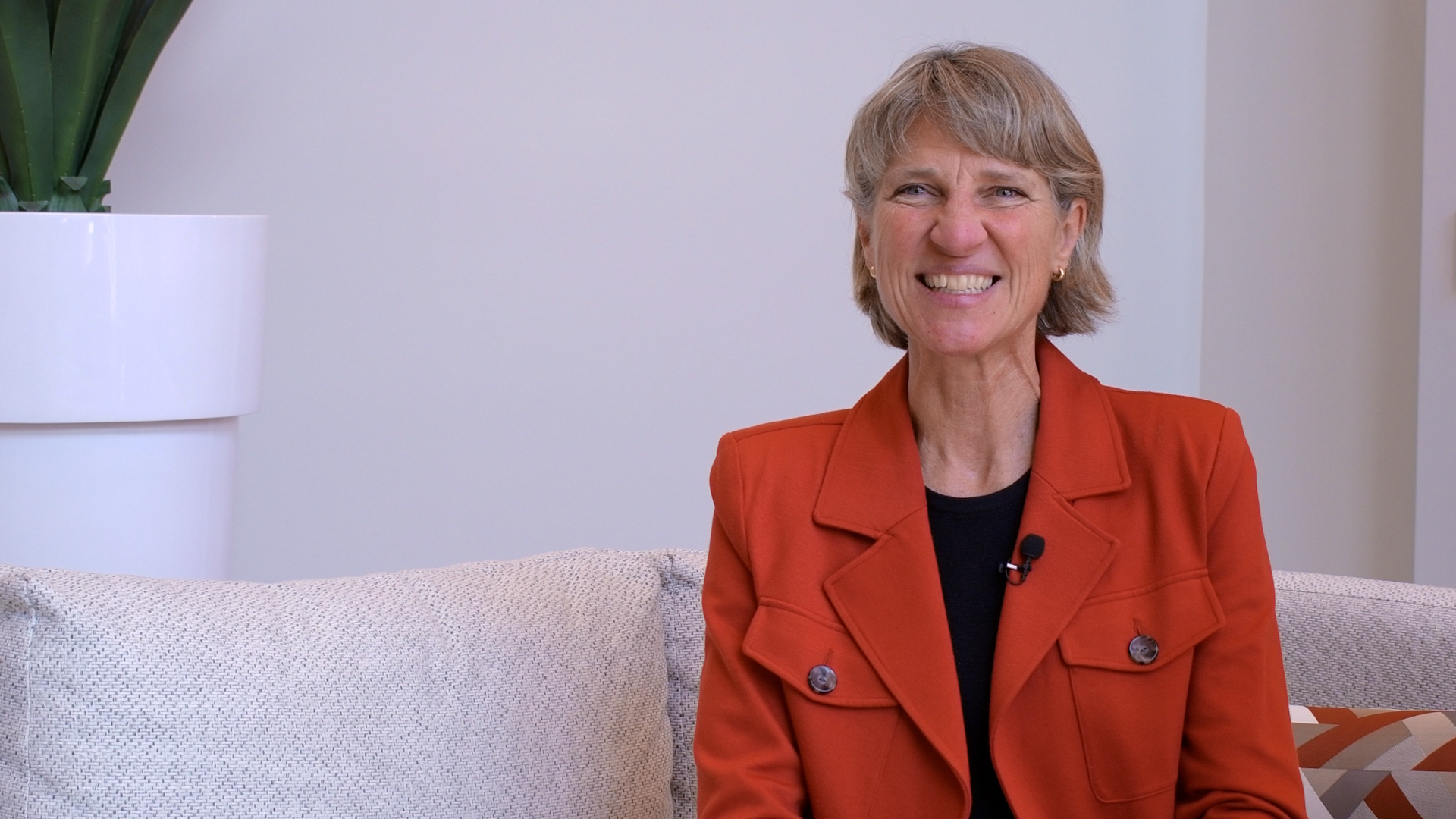Supporting Strategic Plans and Addressing Student Transfer: How the Belk Center is Helping to Support Community Colleges Across North Carolina

When staff at the NC State College of Education’s Belk Center for Community College Leadership and Research received a call to see if anybody would be interested in assisting with the state’s Finish Line Grants program, they jumped on board and formed a partnership that led to a statewide gathering to support the future of the work.
Finish Line is a federally-funded grant, introduced by N.C. Gov. Roy Cooper in 2018, that provides emergency financial assistance to community college students. The program is designed to help students with unexpected financial emergencies in an effort to keep them in school to attain a credential or degree.
The Belk Center’s support was crucial in getting the program up to speed and providing data that could inform decisions that address issues and enable the program to reach the maximum number of eligible students, said W. Dallas Herring Professor in Community College Leadership and Belk Center Executive Director Audrey Jaeger, Ph.D., during a Monthly Connect Government-Research Partnerships and COVID-19 Webinar in February.
In September 2019, the Belk Center hosted the Finish Line Grants Symposium, which provided an opportunity for representatives from 53 community colleges and 23 workforce development boards to come together to discuss challenges faced and positive experiences during the grant-funded program’s first year.
“It was a perfect match for us to collaborate with the Governor’s Office on rigorous evaluation and help the community colleges improve their processes for students,” she said.
The Belk Center was established through generous support of the John M. Belk Endowment with the goal of developing the pipeline of community college leaders, providing ongoing leadership development to community college executives and trustees and building capacity for evidence-based decision making and applied research. NC State’s Board of Trustees officially approved the Belk Center as one of NC State’s centers and institutes one year ago.
Ongoing work on the Finish Line Grants program is just one of several ways the Belk Center has provided support to community colleges as they address pressing issues.
Belk Center Research Informs Strategic Planning Process
When Nash Community College President Lew Hunnicutt, Ph.D., found himself in the position of needing to complete a new strategic plan amid the ongoing COVID-19 pandemic, he realized there were few people to turn to for help within the North Carolina Community College System, because nobody had ever developed a new plan during a pandemic before.
Having met Jaeger early in his presidency, he reached out to the Belk Center, which has been providing support for the strategic planning team at Nash Community College as they create an action plan for their strategic planning process. Hunnicutt was able to outline his needs through one-on-one consultations with Director of Strategic Initiatives and External Relations Jemilia Davis, Ph.D., and Professor of the Practice Ken Ender, Ph.D., who have also facilitated three working sessions to develop an action plan centered around evidence-based strategies and provided recommendations of tools, resources and promising practices.
“The program they developed helped train my strategic planning team to succeed in the virtual world we are all living in. They brought the tools to the table that we needed to be successful, they engaged my team before, during and after our meetings and helped us develop the plan for successfully completing our strategic plan,” Hunnicutt said. “I can say without hesitation that we would not be anywhere near as far in the process as we are without the assistance of the Belk Center.”
Like Hunnicutt, more than half of North Carolina’s 58 community colleges have strategic plans that will conclude in 2020, with an additional 13 having plans that expire in 2021.
In a 2020 study, the Belk Center collected and analyzed strategic plans from 55 North Carolina community colleges to determine how the institutions documented their intent and progress in promoting student success.
“Because strategic plans offer a unique perspective of the mission, values and goals that guide a college’s commitment and desired outcomes, including student success, we believe these plans capture the direction that our state is going,” Davis said. “As we hope to support our colleges in improving equitable student outcomes, this is one area where we saw an opportunity to learn more.”
“How N.C. Community College Strategic Plans Support Student Success,” published in December 2020, found that strategic plans for institutions across the North Carolina Community College System varied widely in structure, content and process, leaving an opportunity for campuses to engage in planning efforts that align both systemwide and with state labor force needs.
To make statewide progress, the study suggested that having similar language and goals apparent across all 58 colleges’ strategic plans would show statewide efforts; yet, individualized context must inform metrics and plan implementation. In addition, many strategic plans did not directly address issues of equity, which left an opportunity to include goals related to equity in student outcomes in updated versions.
As the Belk Center engaged in this research, community college presidents expressed interest in receiving support, which led to the development of individualized plans to support institutions in the strategic planning process.
In February of 2020, the Belk Center facilitated sessions at Wake Technical Community College’s Reach ‘N Rally Summit, which engaged more than 200 organizational leaders as part of their strategic planning process, and drafted a report that summarized key takeaways to help inform the next stage of the strategic planning process.
In August 2020, the Belk Center joined Achieving the Dream and the Aspen Institute’s College Excellence Program in an assessment of Durham Technical Community College’s student success work, which was one of several activities aimed at creating a new strategic plan. The three organizations provided a report, facilitated conversations with the college’s Board of Trustees to share findings and recommendations, and continues to engage with President JB Buxton as Durham Tech moves forward with its strategic plan.
Helping Community College Transfer Students Succeed
With more than 80% of community college students saying they plan to transfer to a four-year institution to earn a bachelor’s degree, only 15% are actually achieving this goal nationally. Transfer success is an important metric in measuring community college success.
Over the past year, research associates at the Belk Center have engaged in several studies related to various aspects of community college student transfer. This includes a recent report published in Research in Higher Education that found that the state’s revised Comprehensive Articulation Agreement — a system designed to ease transfer pathways between community colleges and University of North Carolina System institutions — was having a modest impact on excess credit accumulation for transfer students.
[spotlight-box label=”” img=”” heading=”Putting Research into Action” cta=”” url=””]
The Belk Center for Community College Leadership and Research is conducting research in multiple areas related to community college student success, including dual enrollment, student experiences and teaching and learning. Learn more about their research and read other recent briefs and reports here.
[/spotlight-box]
In addition, three reports published by the Belk Center in February 2021 examined various aspects of transfer student success, including one that explored transfer practices and student support initiatives that influence success and degree completion for students who transfer to public HBCUs in North Carolina.
The briefing suggested that both community colleges and public HBCUs should consider implementing faculty professional development related to advising and mentoring transfer students with diverse academic backgrounds. In addition, they should seek specific feedback from transfer students to improve the transfer experience and strengthen the relationship between HBCUs and community colleges through communication, advising and financial aid planning.
Karrie Dixon ‘97, ‘03EDD, chancellor of Elizabeth City State University, said the work of the Belk Center has allowed her institution and other historically Black colleges and universities to highlight opportunities for students transferring from community colleges.
“They have provided us with important data, trend analysis and recommended areas for best practices to strengthen transfer student success to public HBCUs in the state of North Carolina,” she said.
The second report, focused on long-term completion and transfer outcomes, found that while more than half of North Carolina community college students either completed a credential, transferred or remained enrolled after eight years, Pell Grant recipients and part-time students had overall lower rates of transfer and completion. The third report, which explored the demographics of transfer students and completion rates among individual groups, found that female students and students from American Indian/Alaska Native and Black/African American backgrounds complete bachelor’s degrees at lower-than-average rates.
“The results of these research endeavors will help policymakers better understand what is working well and what still needs to be modified in order to ensure equitable outcomes for all students,” said Jonathan E. Loss, Ed.D., Transfer Advisory Committee chair and dean at Catawba Community College. “The Transfer Advisory Committee gratefully welcomes this important work as we share a common goal to ensure a successful transfer experience for all students in North Carolina.”
Training the Next Generation of Researchers
In addition to conducting research that is informing practice among community colleges in North Carolina, the Belk Center is also helping to train future researchers who will continue to address pressing issues related to community college success nationwide.
Graduate students and postdoctoral scholars at the Belk Center have the opportunity to fully develop and implement a research project and engage with practitioners who will use their findings in order to learn what practitioners and policymakers deem important.
“Working with practitioners to understand and convey research helps them apply their work to problems of practice,” Jaeger said. “These experiences will allow graduate students and postdoctoral scholars the opportunity to enter new positions with the skills necessary to independently engage in rigorous research while also ensuring their research is conveyed in a manner that can contribute to improved practice.”
Melissa Whatley, Ph.D., who has worked as a postdoctoral scholar at the Belk Center, said her experience helped to prepare her for her new role as an assistant professor of international and global education at the School for International Training, where she will teach and advise doctoral students in quantitative research methods.
“My experience working with the doctoral students in NC State’s Community College Leadership program through the Belk Center has certainly prepared me well to move into this position. I will be able to draw on this experience as I design my future program’s quantitative methods courses and advise future doctoral students,” she said.
Additionally, the Postsecondary Career and Technical Education Research Fellows Program at NC State University, which is hosted through the Belk Center and sponsored by a three-year, $2 million grant from the ECMC Foundation, helps to train researchers from across the country as they conduct research to improve learning, completion, equity and labor market outcomes of community college students.
Michelle Bartlett, Ph.D., an assistant teaching professor in the NC State College of Education and co-principal investigator on the project, said that collaborations between fellows, mentors and sponsors related to the Research Fellows Program have led to presentations, journal articles and grant proposals to further explore issues related to career and technical education.
In addition, experts from across the nation have been invited to teach research methods through webinars, helping fellows understand new tools to use in their research beyond the fellowship. The Belk Center, Jaeger said, provides opportunities for scholars that catalyze their careers.
“In the last year, fellows from the program presented research at several national conferences, such as the American Educational Research Association (AERA). Not only are they presenting, but they were recognized with the Association of Career and Technical Education (ACTER) Best Dissertation of the Year as well as the ACTER Conference Best Symposium and Best Research Paper awards,” said James Bartlett, Ph.D., the project’s principal investigator.
- Categories:


